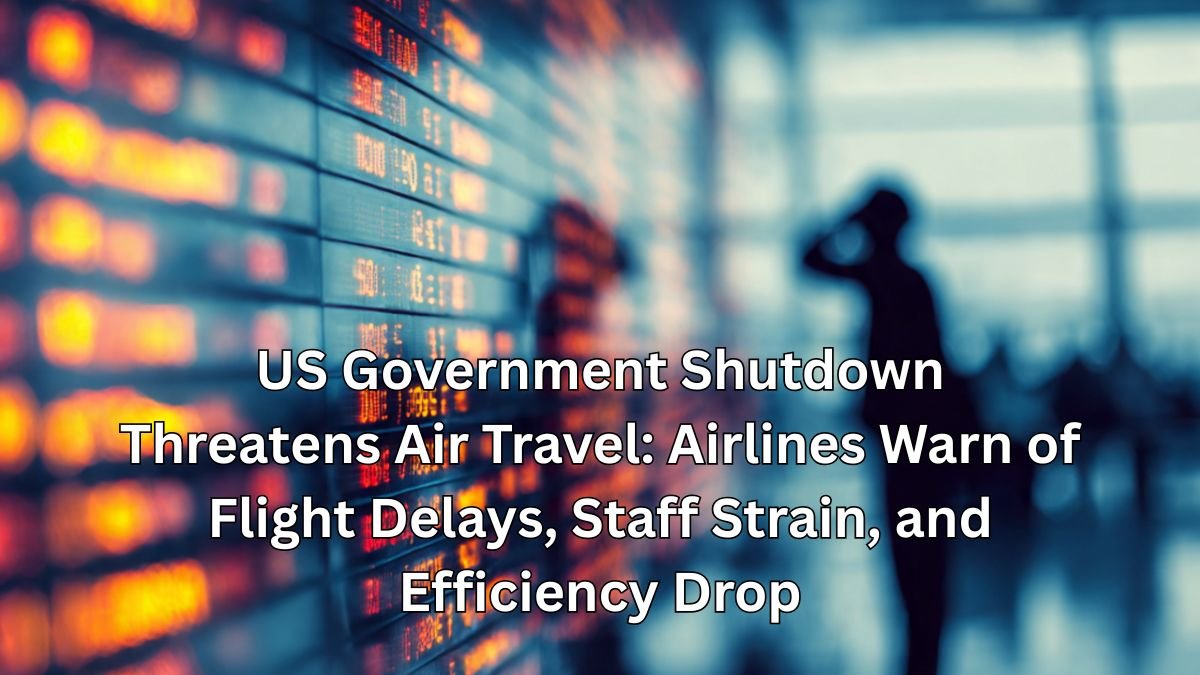WASHINGTON D.C. – The looming deadline for federal funding has triggered a major alarm from US airlines, who are now warning travelers to brace for potential disruptions. On Monday, major carriers cautioned that a partial federal government shutdown, expected to begin on Wednesday unless lawmakers reach a deal, would place an “immense strain” on the nation’s entire aviation system, likely leading to slower flights and reduced efficiency.
The core of the problem stems from the requirement that key federal aviation personnel must continue working without pay.
Essential Personnel Working Without Pay
If Congress fails to pass a funding bill, essential employees—specifically air traffic controllers and approximately 50,000 Transportation Security Administration (TSA) airport security officers—will be forced to remain on the job but will not receive their paychecks.
The industry’s primary trade group, Airlines for America (A4A), which represents major carriers including Delta Air Lines, United Airlines, American Airlines, and Southwest Airlines, issued a stark warning. The organization stated that if funding lapses, “the system may need to slow down, reducing efficiency” and negatively impacting millions of travelers.
“When federal employees who manage air traffic, inspect aircraft, and secure our nation’s aviation system are furloughed or working without pay, the entire industry and millions of Americans feel the strain,” A4A said in a statement.
A Look Back at Past Disruptions
Concerns about staffing and efficiency are not merely speculative; they are based on recent history. During the 35-day government shutdown that occurred in 2019, data showed a noticeable increase in the number of sick-call absences among both air traffic controllers and TSA officers as they missed paychecks. This staff shortage directly led to extended wait times at security checkpoints in major airports.
Crucially, the Federal Aviation Administration (FAA) was compelled to slow down air traffic operations in the congested New York airspace during the 2019 shutdown, a move that placed significant pressure on lawmakers to end the political standoff swiftly.
Long-Term Blows to Aviation
The potential negative impact extends beyond immediate delays and lines. A separate letter signed by a broad coalition of industry groups—including aviation unions, manufacturers, and airports—outlined the severe damage a prolonged shutdown would inflict on the FAA’s long-term capabilities:
- Hiring Freeze: A shutdown would force the FAA to immediately suspend the crucial hiring and training of new air traffic controllers and technicians. The agency is already facing a significant controller shortage, estimated at around 3,800 workers below targeted staffing levels.
- Safety and Modernization Delays: The letter warned that a funding lapse would delay critical safety initiatives, postpone essential maintenance and repair work on air traffic control systems, and slow the ongoing $12.5 billion overhaul of the nation’s air traffic management system.
- Aircraft Certification at Risk: An extensive shutdown could even delay the FAA’s certification of new aircraft, such as the Boeing 737 MAX 7.
The National Air Traffic Controllers Association specifically noted that hundreds of air traffic control trainees at the FAA Academy could be furloughed, worsening the existing staffing crisis and “causing significant delays in the training pipeline.”
Political Stalemate Continues
The warning from the aviation sector is the latest consequence of the political dispute in Washington over a federal funding agreement. The shutdown is scheduled to commence on Wednesday unless both Democrats and Republicans in Congress can resolve their differences and approve a spending bill. Congressional leaders reported leaving a meeting on Monday without having reached a deal to prevent the fiscal crisis.
Conclusion
The threat of a government shutdown looms large over American air travel, pushing the aviation system toward potential chaos just as many travelers begin their journeys. While essential services like air traffic control and airport security are mandated to continue, the forced labor without pay for thousands of federal employees creates a severe strain that history shows will likely translate into longer lines, frustrating delays, and a less efficient system for everyone flying. The industry’s unified call to action emphasizes that Congress must urgently find a solution to safeguard the nation’s air travel infrastructure.
Affiliate Disclosure
This article does not contain affiliate links. We do not receive compensation for any links provided.
Disclaimer
The information in this article is based on public warnings and statements from U.S. airlines and aviation groups regarding the potential effects of a U.S. federal government shutdown. Flight delays, service changes, or airport wait times are subject to change and are dependent on political decisions beyond our control. Readers are advised to check the official websites of their airlines and the Transportation Security Administration (TSA) for the most up-to-date travel status and operational information.
Official Website Links:
- Airlines for America (A4A): https://www.airlines.org/
- Federal Aviation Administration (FAA): https://www.faa.gov/
- Transportation Security Administration (TSA): https://www.tsa.gov/
- National Air Traffic Controllers Association (NATCA): https://www.natca.org/







